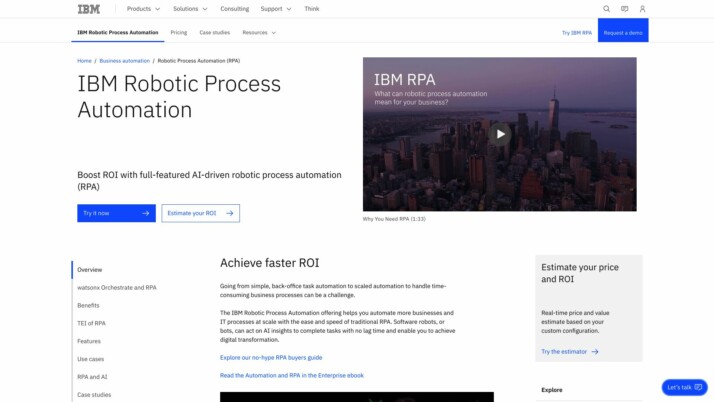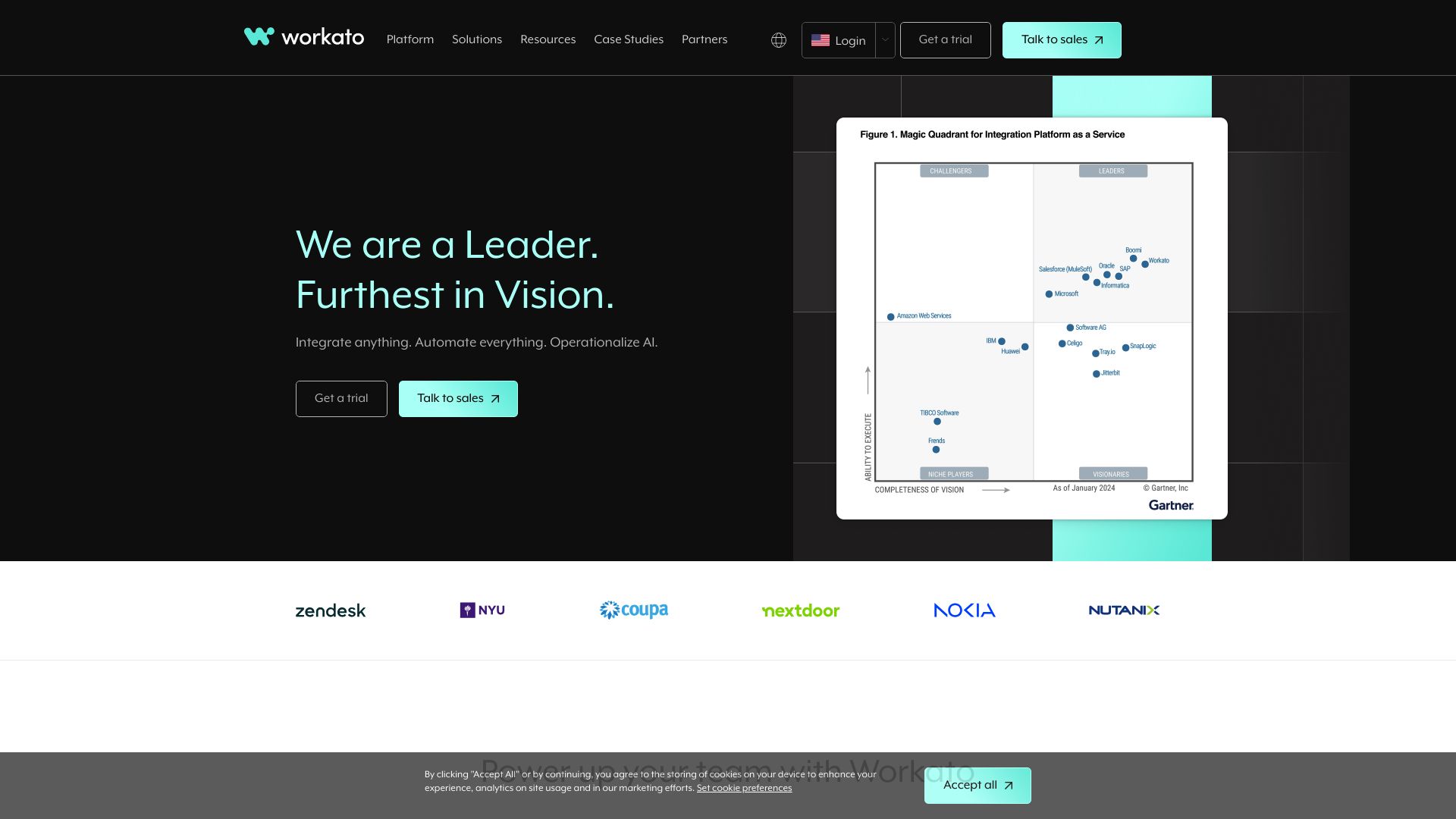IBM RPA vs. Workato: AI Automation Titans Compared
AI-powered automation reshapes business operations, driving efficiency and innovation across industries. As organizations seek powerful yet accessible solutions, the choice of platform becomes crucial. This comparison explores IBM RPA vs. Workato, and SmythOS, examining their strengths in robotic process automation, workflow integration, and AI capabilities.
We’ll dive into key features, security measures, and scalability options to help you identify the ideal solution for your automation needs. Whether you’re a developer seeking advanced customization, a business leader focused on enterprise-grade security, or a non-technical user looking for intuitive tools, this analysis provides valuable insights to guide your decision-making process.
IBM RPA Overview
IBM RPA transforms business operations through intelligent automation. This enterprise-grade platform empowers organizations to create, deploy, and manage software robots that streamline repetitive tasks across diverse applications and systems.


IBM RPA transforms business operations through intelligent automation… empowers organizations to create, deploy, and manage software robots that streamline repetitive tasks
The IBM RPA suite caters to both technical and non-technical users. Its low-code authoring tools feature a visual builder, enabling rapid bot creation with prebuilt commands. This approach democratizes automation, allowing business users to construct workflows without extensive programming knowledge. For developers, the platform offers advanced customization options to tackle complex automation scenarios.
Key strengths of IBM RPA include its scalability and integration capabilities. The platform supports concurrent bot execution, enabling multiple automations to work in tandem. It seamlessly connects with various enterprise systems, from legacy mainframes to modern APIs, facilitating comprehensive process automation. The integration with watsonx Orchestrate further enhances the platform’s AI-driven capabilities, allowing for intelligent decision-making within automated workflows.
IBM RPA prioritizes security and governance. It incorporates robust encryption measures for data handling and integrates with IBM OpenPages for comprehensive audit logging and compliance management. This focus on transparency and control makes IBM RPA particularly suitable for industries with stringent regulatory requirements.
While IBM RPA offers a powerful suite of tools, its enterprise focus may present a steeper learning curve for smaller organizations or individual users. The platform’s extensive features and integration capabilities, while valuable for large-scale deployments, might be overwhelming for simpler automation needs. Additionally, pricing information is not readily available, potentially making cost assessment challenging for prospective users.
Workato Overview
Workato empowers businesses to automate complex workflows and integrate AI capabilities without extensive coding. The platform combines low-code tools with enterprise-grade features, catering to both technical and non-technical users across various industries.


Workato’s AI by Workato, developed in collaboration with OpenAI, enables users to integrate AI models and prompts into their workflows. This feature supports tasks like text analysis, categorization, email drafting, and translation. The platform’s low-code/no-code interface accelerates automation development, making it accessible to business users while still offering the depth required by experienced developers.
Workato’s AI by Workato … enables users to integrate AI models and prompts into their workflows. This feature supports tasks like text analysis, categorization, email drafting, and translation.
The platform shines in its comprehensive workflow automation capabilities. It combines data storage, user interface design, and business logic in a unified experience. Workato’s Table Storage provides robust and secure data management, while its drag-and-drop interface allows for quick UI customization. Pre-built solutions like the Knowledge Workbot Accelerator and Actions by Large Language Model further streamline the integration of AI into enterprise applications.
Workato’s enterprise focus addresses scalability, security, and governance needs, making it suitable for large organizations with complex automation requirements. The platform’s marketplace offers over 1,500 connectors and community recipes, fostering collaboration and reducing development time. However, the cost structure may pose challenges for smaller organizations or those with limited budgets.
While Workato offers powerful features, users should be aware of certain limitations. The AI capabilities have rate limits, such as 100 actions per workspace in a 24-hour period. Additionally, the lack of granular permission settings for AI features means all collaborators within a workspace have access, regardless of their role. Organizations heavily relying on pre-built solutions may find their customization options limited for unique use cases.
Feature Comparison
IBM RPA and Workato offer distinct approaches to automation and AI integration, with notable differences in their core components and security features. IBM RPA excels in enterprise-grade robotic process automation, providing robust tools for creating and managing software bots. Its integration with watsonx Orchestrate enables AI-driven decision-making within automated workflows. Workato, on the other hand, focuses on low-code/no-code workflow automation with AI capabilities through its AI by Workato feature.
In terms of core components, IBM RPA offers a comprehensive suite for bot development, including visual builders and debugging tools. Workato emphasizes its drag-and-drop interface and pre-built connectors, making it more accessible for non-technical users. However, IBM RPA’s enterprise focus may provide more advanced customization options for complex automation scenarios.
Security features reveal significant gaps between the two platforms. IBM RPA integrates with IBM OpenPages for extensive audit logging and compliance management, addressing stringent regulatory requirements. Workato’s security measures, while present, lack the same level of granularity, particularly in AI feature permissions. This gap could be critical for organizations in highly regulated industries.
Both platforms offer scalability and integration capabilities, but their approaches differ. IBM RPA’s strength lies in its ability to connect with legacy systems and support concurrent bot execution. Workato’s marketplace of connectors and community recipes provides a wide range of integration options, potentially offering more flexibility for diverse application ecosystems.
Feature Comparison Table
| IBM RPA | Workato | SmythOS | |
|---|---|---|---|
| CORE FEATURES | |||
| AI Agents | ❌ | ✅ | ✅ |
| Memory & Context | ❌ | ✅ | ✅ |
| Autonomous Agents | ❌ | ❌ | ✅ |
| Explainability & Transparency | ❌ | ✅ | ✅ |
| Multimodal | ❌ | ❌ | ✅ |
| Problem-Solving Capabilities | ❌ | ✅ | ✅ |
| Multi-Agent Collaboration | ❌ | ❌ | ✅ |
| Work as Team | ❌ | ✅ | ✅ |
| SECURITY | |||
| Constrained Alignment | ❌ | ❌ | ✅ |
| OAuth | ❌ | ✅ | ✅ |
| IP Control | ❌ | ✅ | ✅ |
| COMPONENTS | |||
| Foundation AIs | ❌ | ✅ | ✅ |
| Huggingface AIs | ❌ | ❌ | ✅ |
| Zapier APIs | ❌ | ❌ | ✅ |
| Classifiers | ❌ | ✅ | ✅ |
| Data Lakes | ❌ | ❌ | ✅ |
| DEPLOYMENT OPTIONS (EMBODIMENTS) | |||
| Deploy as Webhook | ❌ | ✅ | ✅ |
| Staging Domains | ❌ | ✅ | ✅ |
| Production Domains | ❌ | ✅ | ✅ |
| API Authentication (OAuth + Key) | ❌ | ✅ | ✅ |
| Deploy as Site Chat | ❌ | ✅ | ✅ |
| Deploy as GPT | ❌ | ✅ | ✅ |
| DATA LAKE SUPPORT | |||
| Hosted Vector Database | ❌ | ❌ | ✅ |
| Sitemap Crawler | ❌ | ❌ | ✅ |
| YouTube Transcript Crawler | ❌ | ❌ | ✅ |
| URL Crawler | ❌ | ❌ | ✅ |
Best Alternative to IBM RPA and Workato
SmythOS stands out as the superior alternative to IBM RPA and Workato, offering a comprehensive AI automation platform that combines ease of use with a rich feature set. Our platform empowers users to create and deploy AI agents for unlimited use cases, surpassing the capabilities of traditional RPA and workflow automation tools.
We excel in providing a user-friendly experience without sacrificing advanced functionality. Our drag-and-drop interface allows both technical and non-technical users to build sophisticated AI workflows quickly. Unlike IBM RPA’s focus on robotic process automation or Workato’s emphasis on integrations, SmythOS offers a holistic approach to AI-driven automation that adapts to your unique business needs.
Our platform’s standout features include autonomous agents, multi-agent collaboration, and advanced problem-solving capabilities. These functionalities enable businesses to tackle complex challenges that go beyond simple process automation. SmythOS agents can work together, learn from interactions, and make intelligent decisions, setting a new standard for AI automation.
SmythOS agents can work together, learn from interactions, and make intelligent decisions, setting a new standard for AI automation.
Security and scalability are paramount in SmythOS. We offer robust data encryption, OAuth integration, and IP control features that meet enterprise-grade requirements. Our platform scales seamlessly to accommodate growing demands, ensuring that your AI solutions can evolve with your business without compromising performance or security.
By choosing SmythOS, you’re not just selecting an automation tool – you’re embracing a future-proof AI ecosystem. Our platform’s ability to integrate with various AI models, APIs, and data sources provides unparalleled flexibility and power. Whether you’re building chatbots, analyzing complex data sets, or automating intricate workflows, SmythOS equips you with the tools to innovate and succeed in the AI-driven landscape.
Conclusion
IBM RPA and Workato offer powerful automation solutions, each with unique strengths. IBM RPA excels in enterprise-grade robotic process automation, providing robust tools for creating and managing software bots. Its integration with watsonx Orchestrate enables AI-driven decision-making within automated workflows. Workato focuses on low-code/no-code workflow automation with AI capabilities through its AI by Workato feature, making it accessible to a broader range of users.
However, both platforms have limitations. IBM RPA’s enterprise focus may present a steeper learning curve for smaller organizations, while Workato’s AI capabilities have rate limits and lack granular permission settings. These factors could impact scalability and customization for certain use cases.
SmythOS emerges as a superior alternative, addressing the limitations of both IBM RPA and Workato while offering unparalleled flexibility and power. Our platform’s intuitive drag-and-drop interface democratizes AI development, making it accessible to users with varying technical expertise. We provide extensive integration capabilities, supporting over 300,000 integrations and a wide array of AI models from different providers.
With SmythOS, users can create once and deploy anywhere, from APIs and chatbots to scheduled agents and GPT models. Our platform offers robust security features, scalability, and the ability to handle complex, multi-agent collaborations. For businesses seeking a comprehensive, user-friendly, and highly adaptable AI automation solution, SmythOS stands out as the clear choice. Explore our diverse range of AI-powered agent templates to jumpstart your automation journey, or get started with a free SmythOS account to experience the future of AI-driven productivity firsthand.
Last updated:
Disclaimer: The information presented in this article is for general informational purposes only and is provided as is. While we strive to keep the content up-to-date and accurate, we make no representations or warranties of any kind, express or implied, about the completeness, accuracy, reliability, suitability, or availability of the information contained in this article.
Any reliance you place on such information is strictly at your own risk. We reserve the right to make additions, deletions, or modifications to the contents of this article at any time without prior notice.
In no event will we be liable for any loss or damage including without limitation, indirect or consequential loss or damage, or any loss or damage whatsoever arising from loss of data, profits, or any other loss not specified herein arising out of, or in connection with, the use of this article.
Despite our best efforts, this article may contain oversights, errors, or omissions. If you notice any inaccuracies or have concerns about the content, please report them through our content feedback form. Your input helps us maintain the quality and reliability of our information.
